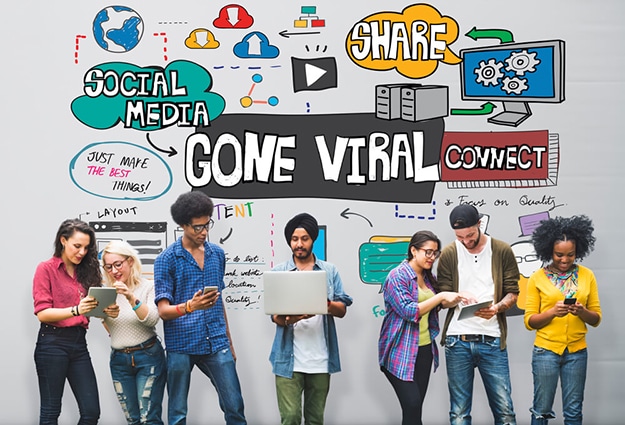It’s very difficult to figure out why some pieces of media become popular and others don’t. It’s even more of a mystery when it comes to viral content. It just seems to spring out of nowhere, and it’s almost impossible to tell where it came from. Still, if you look at a large enough sample, you’ll notice there are certain things all memes and viral videos share. This list can help you gain some insight as to what makes some content extremely popular and how you can use that to your advantage.
Use Engaging Media
When we think of viral content, there are two things that tend to come to mind instantly: memes and viral videos. Sometimes, short pieces of writing become viral as well. What all of these media have in common is that they’re easy to digest and share. [pullquote]It’s unlikely you’re ever going to see a long think-piece become viral (that does happen from time to time, but the timing and topic have to be just right).[/pullquote]
Images, whether they’re static or moving, tend to make the best viral content. It’s going to be interesting to see how virtual reality is going to fit in with all of this. Many believe VR is the future of cable and video games, so it’s definitely going to be a medium to try out for producing viral content as well – we recommend a powerful internet plan like Charter Spectrum for high quality and fast results. For it’s utterly important to ensure speed if you’re to produce virality, thus high traffic.
The media you choose doesn’t guarantee the success or failure, for that matter, of your content. What’s important is that the media should fit the content itself and it should be attention-grabbing and shareable, the two main ingredients of viral content.
Look At Common Experiences From A Different Perspective
What makes viral content especially appealing is that it reaches out to people using some common experience or feeling. However, it’s not enough to just point the topic. Content needs to offer something more. Often this means taking a fresh new look at something we tend to take for granted. Or it can be something we think nobody else does but is actually quite common.
There’s actual science behind the emotions that lead to content becoming contagious. Positive feelings and admiration tend to be associated with virality more often than negative emotions. These positive feelings are often coupled with a sense of dominance or being in control. The best way to tap into that is by creating relatable content that’s not trying to pass judgment on anyone but merely points out a common habit or trait and gives it a new spin.
Give The Audience Space To Adapt It
There’s something unique about viral content that no other type of modern media has. Once it becomes popular enough to share on a massive scale, it starts generating spin-offs and adaptions which make it even more famous. In this sense, it really does spread like a virus. However, instead of the virus adapting to the host, it’s the host that changes the virus and spreads it even further.
Naturally, there will be some message you want to send and popularize. However, that shouldn’t be the driving force behind the structure of your content. You should make it such that people reuse it and tailor it to their needs. Otherwise, even if it’s good, audiences are just going to take a look, appreciate it and leave at that. They need to be given the freedom to create their own content from the resources you provide them. In this sense, it’s best to think of your content as a building block for more rather than a finished product in itself.
Viral Content Has A Relatively Short Lifespan
Viral content usually bursts on the scene and can become immensely popular in a matter of hours. However, this quick spread has one downside. Viral content tends to lose its appeal fast as well and thus has a relatively short lifespan. This depends on how malleable the structure of the content is. If it’s constructed more like a meme, meaning it just provides a framework for future user-generated content, then it can last for years. However, if it is a finished piece, its popularity can wane down in a matter of months.
It’s important to take this into consideration when you’re trying to raise brand awareness or popularize a product for two reasons. First, you shouldn’t expect to be able to reuse it over and over again. You should plan viral marketing campaigns for intense, short burst of content and prepare for the next big thing as soon as one piece becomes popular.
Second, you should never try to revive a viral piece once it has stopped being popular. Because these types of media become very popular in a short amount of time, they also have the potential to annoying just as quickly. Audiences are going to recognize when something is at that point and are going to start avoiding it. You should trust their instincts.
Ultimately, the most important thing you can do when crafting a viral campaign is to make that content worth sharing. Make it smart, informative and relatable. However, the other tips on this list will ensure that your content reaches its goal and become a viral sensation.
Author Bio: Michelle Baker (@michelle_m_bake) is a private business growth advisor and proud modern mother of two. She’s very much aware that a business cannot thrive without a brilliant marketing strategy, so she’s doing her best to facilitate the process for each and every one invested in the SMB environment.

COMMENTS